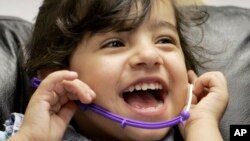A new report by the World Health Organization (WHO) finds up to 60 percent of childhood hearing loss can be prevented. To mark this year’s World Hearing Day on March 3, the U.N. agency is campaigning to raise awareness of the importance of early detection and intervention in preventing or mitigating the loss of this sense in children.
The WHO reports 360 million people around the globe suffer from disabling hearing loss and that nearly 32 million are children. Among that number, 31 million live in middle- and low-income countries.
Alarcos Cieza, who coordinates WHO's program on blindness and deafness prevention, said an estimated 40 percent of childhood hearing loss can be attributed to genetics, with another 31 percent linked to infections.
“We know that there are infections from childhood: illnesses like mumps, meningitis, measles or very common ear infections or infections from the mother, like rubella. So, the action here would be simply immunization or when it is common hearing loss, then the action is good hearing care,” said Cieza.
Cieza added that nearly one-fifth of hearing loss cases in childhood are due to complications at birth, low birth weight and neonatal jaundice. She said maternal and child health programs can prevent this from happening.
She told VOA the stigma associated with hearing loss often discourages families from seeking help for their children and that community-based rehabilitation programs can create awareness and counter the stigma.
“WHO is the U.N. agency behind this community development strategy and… one focus is to combat stigma and empower people with disabilities and their families,” said Cieza.
Cieza said this strategy is being implemented in more than 100 middle- and low-income countries. She said early identification of children with hearing loss is crucial in triggering the needed interventions, such as providing hearing devices.
Where this is not possible, she said giving deaf children the ability to communicate through sign language and other educational skills can dramatically improve their lives.




